-
 Bitcoin
Bitcoin $81,973.5211
-3.14% -
 Ethereum
Ethereum $1,771.8221
-4.70% -
 Tether USDt
Tether USDt $0.9996
-0.04% -
 XRP
XRP $2.0020
-4.93% -
 BNB
BNB $586.3762
-2.30% -
 USDC
USDC $0.9997
-0.03% -
 Solana
Solana $113.7739
-9.53% -
 Dogecoin
Dogecoin $0.1574
-7.43% -
 Cardano
Cardano $0.6244
-7.96% -
 TRON
TRON $0.2315
-2.36% -
 Toncoin
Toncoin $3.6020
-10.34% -
 UNUS SED LEO
UNUS SED LEO $9.3401
-1.03% -
 Chainlink
Chainlink $12.4356
-7.28% -
 Stellar
Stellar $0.2536
-4.73% -
 Avalanche
Avalanche $17.8372
-6.13% -
 Sui
Sui $2.2393
-7.83% -
 Shiba Inu
Shiba Inu $0.0...01195
-3.16% -
 Hedera
Hedera $0.1559
-5.48% -
 Litecoin
Litecoin $80.9170
-1.94% -
 Polkadot
Polkadot $3.8852
-4.23% -
 MANTRA
MANTRA $6.2821
-0.06% -
 Bitcoin Cash
Bitcoin Cash $298.6048
-1.78% -
 Bitget Token
Bitget Token $4.4929
-1.56% -
 Dai
Dai $0.9999
0.01% -
 Ethena USDe
Ethena USDe $0.9995
-0.03% -
 Monero
Monero $211.5827
-1.86% -
 Pi
Pi $0.5588
-16.11% -
 Hyperliquid
Hyperliquid $11.3193
-14.69% -
 Uniswap
Uniswap $5.7424
-4.67% -
 Aptos
Aptos $5.0458
-3.81%
What does blockchain mean and how does it apply to digital identity verification?
Blockchain revolutionizes digital identity verification by offering a secure, decentralized method, enhancing privacy and control over personal data.
Apr 03, 2025 at 02:21 am
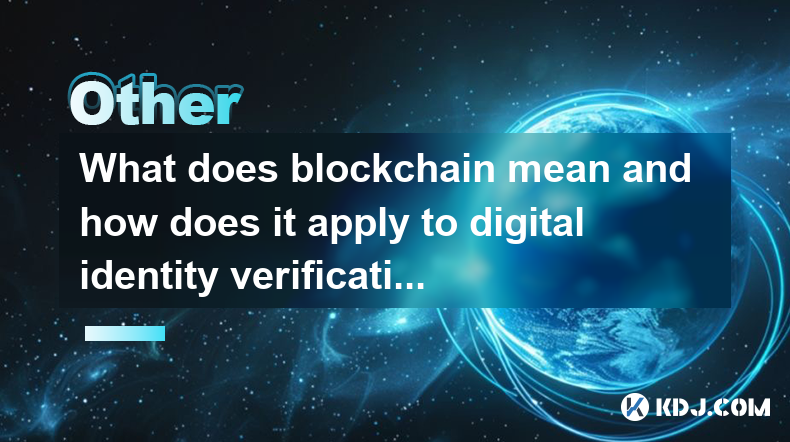
Blockchain technology, at its core, is a decentralized and distributed digital ledger used to record transactions across numerous computers. This ensures that the recorded data cannot be altered retroactively without the alteration of all subsequent blocks and the consensus of the network. The concept of blockchain was initially devised for the digital currency, Bitcoin, but its potential applications have since expanded far beyond cryptocurrencies. In the realm of digital identity verification, blockchain offers a revolutionary approach by providing a secure, transparent, and immutable method for managing and verifying identities.
Understanding Blockchain Technology
Blockchain operates on a principle of consensus, where multiple nodes (computers) in the network must agree on the validity of transactions before they are added to the ledger. Each block in the chain contains a list of transactions, a timestamp, and a cryptographic hash of the previous block, creating a chain of blocks that is virtually tamper-proof. This structure ensures that once data is recorded on the blockchain, it is extremely difficult to change, providing a high level of security and trust.
The Role of Blockchain in Digital Identity Verification
Digital identity verification is crucial in today's digital world, where online interactions and transactions are commonplace. Traditional methods of identity verification often involve centralized databases that are vulnerable to hacks and data breaches. Blockchain technology addresses these vulnerabilities by decentralizing the storage of identity data, making it more secure and less susceptible to single points of failure. By using blockchain, individuals can have greater control over their personal information, deciding who can access it and for what purpose.
How Blockchain Enhances Security and Privacy
One of the key advantages of using blockchain for digital identity verification is the enhanced security it provides. Since the data is distributed across a network of nodes, there is no single point of failure that hackers can exploit. Additionally, the use of cryptographic techniques ensures that the data remains private and can only be accessed by authorized parties. This means that personal information is less likely to be compromised, reducing the risk of identity theft and fraud.
Decentralized Identity Management
Blockchain enables a decentralized approach to identity management, where individuals can create and manage their digital identities without relying on a central authority. This is achieved through the use of self-sovereign identity (SSI) systems, where users have full control over their identity data. In an SSI system, individuals can store their identity information on the blockchain and share it with others as needed, without the need for intermediaries. This not only enhances privacy but also simplifies the process of identity verification.
Use Cases of Blockchain in Digital Identity Verification
There are several practical applications of blockchain in digital identity verification. For instance, in the financial sector, blockchain can be used to streamline the Know Your Customer (KYC) process, allowing banks and financial institutions to verify the identities of their customers more efficiently and securely. Similarly, in the healthcare industry, blockchain can be used to securely manage patient records, ensuring that sensitive medical information is only accessible to authorized healthcare providers. Another use case is in voting systems, where blockchain can be used to create a secure and transparent voting process, reducing the risk of fraud and ensuring the integrity of the electoral process.
Challenges and Considerations
While blockchain offers significant benefits for digital identity verification, there are also challenges and considerations that need to be addressed. One of the main challenges is the scalability of blockchain networks, as they can become slow and expensive as the number of transactions increases. Additionally, there are regulatory and legal considerations, as the use of blockchain for identity verification may be subject to different laws and regulations in different jurisdictions. It is also important to ensure that the technology is user-friendly and accessible to all, as the complexity of blockchain can be a barrier to adoption.
Future Prospects of Blockchain in Digital Identity Verification
The future of blockchain in digital identity verification looks promising, with ongoing research and development aimed at overcoming the current challenges. As the technology matures, we can expect to see more widespread adoption of blockchain-based identity solutions across various industries. The potential for blockchain to revolutionize digital identity verification is immense, offering a more secure, private, and user-centric approach to managing and verifying identities. As more organizations and individuals recognize the benefits of blockchain, we can anticipate a shift towards decentralized identity management systems.
Steps to Implement Blockchain for Digital Identity Verification
Implementing blockchain for digital identity verification involves several key steps:
- Choose the Right Blockchain Platform: Select a blockchain platform that suits your needs, such as Ethereum, Hyperledger, or Corda, based on factors like scalability, security, and ease of use.
- Design the Identity System: Develop a self-sovereign identity system that allows users to control their own identity data, using standards like the Decentralized Identifiers (DIDs) and Verifiable Credentials (VCs).
- Integrate with Existing Systems: Ensure that the blockchain-based identity system can integrate seamlessly with existing systems and processes, such as KYC and AML compliance.
- Ensure Security and Privacy: Implement robust security measures, such as encryption and multi-signature wallets, to protect identity data and ensure user privacy.
- Educate and Train Users: Provide education and training to users on how to use the blockchain-based identity system, ensuring that they understand the benefits and how to manage their digital identities effectively.
- Monitor and Update: Continuously monitor the system for any issues or vulnerabilities and update it as necessary to maintain its security and efficiency.
Common Questions Related to Blockchain and Digital Identity Verification
Q: What is blockchain technology?
A: Blockchain technology is a decentralized and distributed digital ledger used to record transactions across numerous computers. It ensures that the recorded data cannot be altered retroactively without the alteration of all subsequent blocks and the consensus of the network.
Q: How does blockchain enhance digital identity verification?
A: Blockchain enhances digital identity verification by providing a secure, transparent, and immutable method for managing and verifying identities. It decentralizes the storage of identity data, making it more secure and less susceptible to single points of failure, and allows individuals to have greater control over their personal information.
Q: What is self-sovereign identity (SSI)?
A: Self-sovereign identity (SSI) is a decentralized approach to identity management where individuals have full control over their identity data. Users can store their identity information on the blockchain and share it with others as needed, without the need for intermediaries.
Q: What are some use cases of blockchain in digital identity verification?
A: Some use cases include streamlining the Know Your Customer (KYC) process in the financial sector, securely managing patient records in the healthcare industry, and creating a secure and transparent voting process in electoral systems.
Q: What are the challenges of using blockchain for digital identity verification?
A: Challenges include the scalability of blockchain networks, regulatory and legal considerations, and ensuring that the technology is user-friendly and accessible to all.
Q: What is the future of blockchain in digital identity verification?
A: The future looks promising, with ongoing research and development aimed at overcoming current challenges. As the technology matures, we can expect more widespread adoption of blockchain-based identity solutions across various industries, offering a more secure, private, and user-centric approach to managing and verifying identities.
Disclaimer:info@kdj.com
The information provided is not trading advice. kdj.com does not assume any responsibility for any investments made based on the information provided in this article. Cryptocurrencies are highly volatile and it is highly recommended that you invest with caution after thorough research!
If you believe that the content used on this website infringes your copyright, please contact us immediately (info@kdj.com) and we will delete it promptly.
- Why XRP Investors Are Rushing to ExoraPad Presale
- 2025-04-03 21:45:12
- Polkadot (CRYPTO: DOT) cryptocurrency isn't getting any market love these days
- 2025-04-03 21:45:12
- Despite Launching the RLUSD Stablecoin, XRP Price Dips as Trump's Tariffs Trigger Market Turmoil
- 2025-04-03 21:40:11
- Ripple Has Once Again Unlocked a Massive 1 Billion XRP
- 2025-04-03 21:40:11
- Bitcoin price crashes to $80k as Trump announces tariffs on 50+ countries
- 2025-04-03 21:35:12
- Prominent crypto analyst sparks excitement with bold forecasts for Ethereum and Ripple
- 2025-04-03 21:35:12
Related knowledge

What are the future development trends of blockchain game development?
Apr 03,2025 at 05:00am
Blockchain technology has revolutionized various industries, and gaming is no exception. As we look to the future, several trends are set to shape the development of blockchain games. These trends not only promise to enhance the gaming experience but also to integrate blockchain technology more seamlessly into the gaming ecosystem. Let's explore these t...

What are the maintenance costs of blockchain system development?
Apr 03,2025 at 06:07pm
The maintenance costs of blockchain system development are multifaceted and depend on various factors. These costs can include technical maintenance, security updates, infrastructure expenses, and personnel costs. Understanding these elements is crucial for anyone planning to develop or maintain a blockchain system. Technical MaintenanceTechnical mainte...
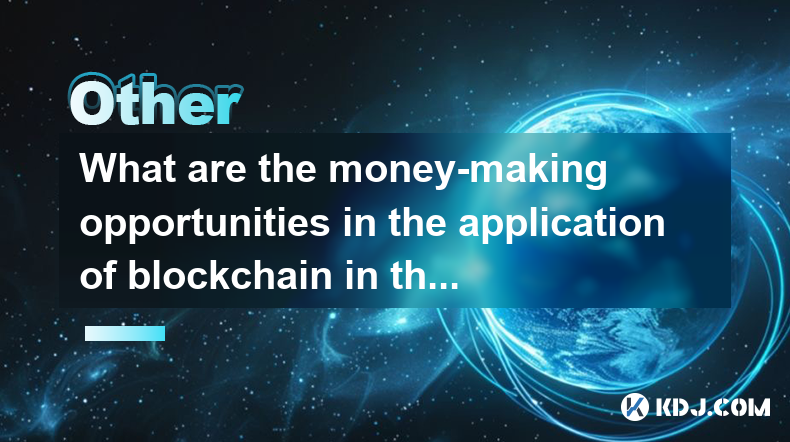
What are the money-making opportunities in the application of blockchain in the medical industry?
Apr 03,2025 at 03:35am
The integration of blockchain technology into the medical industry presents a myriad of money-making opportunities that can revolutionize healthcare systems. Blockchain's inherent characteristics, such as transparency, security, and immutability, make it an ideal solution for various medical applications. By leveraging blockchain, companies can develop ...
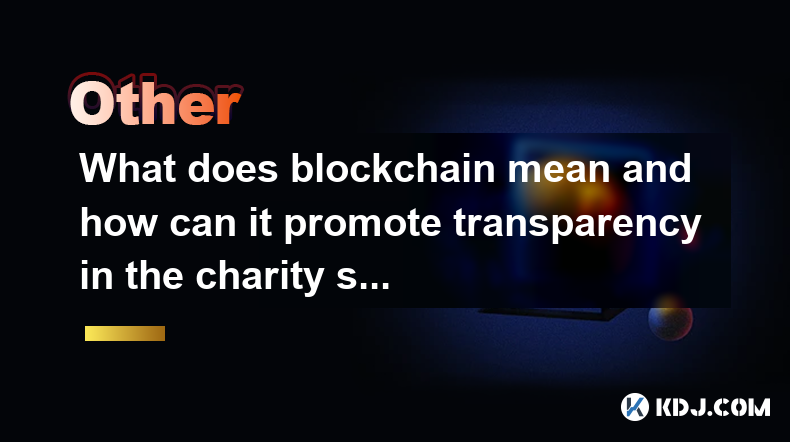
What does blockchain mean and how can it promote transparency in the charity sector?
Apr 03,2025 at 08:29pm
Blockchain technology is a decentralized, distributed ledger that records transactions across numerous computers. This ensures that the data is transparent and nearly impossible to alter retroactively. Essentially, blockchain serves as a digital ledger of all cryptocurrency transactions, enabling secure and direct exchanges without the need for intermed...
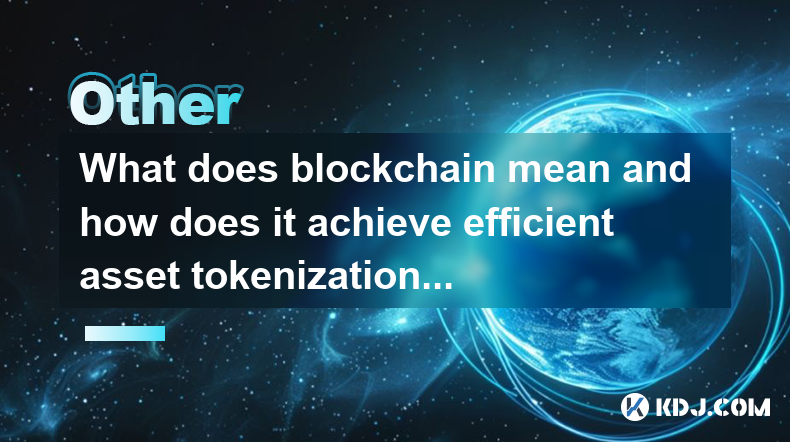
What does blockchain mean and how does it achieve efficient asset tokenization?
Apr 03,2025 at 07:57pm
Blockchain technology is a decentralized, distributed ledger that records transactions across numerous computers. It ensures that each transaction is secure, transparent, and immutable. The concept of blockchain was introduced with the launch of Bitcoin in 2009, but its applications have since expanded far beyond cryptocurrencies. At its core, blockchai...
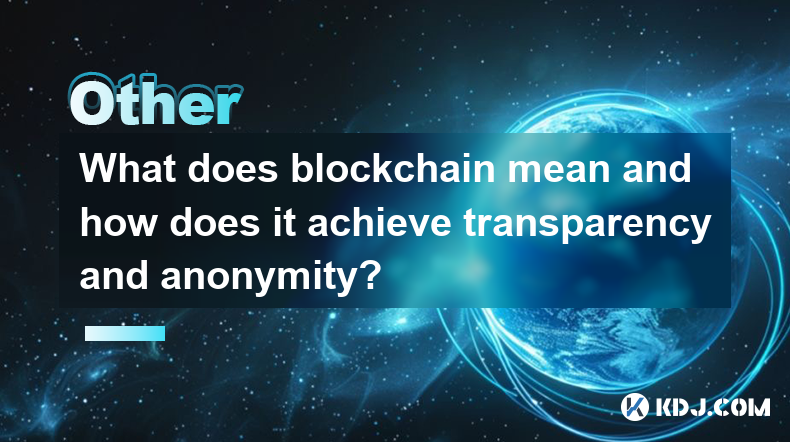
What does blockchain mean and how does it achieve transparency and anonymity?
Apr 03,2025 at 11:28am
Blockchain technology is a decentralized, distributed ledger that records transactions across numerous computers. It ensures that once data is recorded, it cannot be altered retroactively without the alteration of all subsequent blocks and the consensus of the network. This technology underpins cryptocurrencies like Bitcoin and Ethereum, providing a sec...

What are the future development trends of blockchain game development?
Apr 03,2025 at 05:00am
Blockchain technology has revolutionized various industries, and gaming is no exception. As we look to the future, several trends are set to shape the development of blockchain games. These trends not only promise to enhance the gaming experience but also to integrate blockchain technology more seamlessly into the gaming ecosystem. Let's explore these t...

What are the maintenance costs of blockchain system development?
Apr 03,2025 at 06:07pm
The maintenance costs of blockchain system development are multifaceted and depend on various factors. These costs can include technical maintenance, security updates, infrastructure expenses, and personnel costs. Understanding these elements is crucial for anyone planning to develop or maintain a blockchain system. Technical MaintenanceTechnical mainte...

What are the money-making opportunities in the application of blockchain in the medical industry?
Apr 03,2025 at 03:35am
The integration of blockchain technology into the medical industry presents a myriad of money-making opportunities that can revolutionize healthcare systems. Blockchain's inherent characteristics, such as transparency, security, and immutability, make it an ideal solution for various medical applications. By leveraging blockchain, companies can develop ...

What does blockchain mean and how can it promote transparency in the charity sector?
Apr 03,2025 at 08:29pm
Blockchain technology is a decentralized, distributed ledger that records transactions across numerous computers. This ensures that the data is transparent and nearly impossible to alter retroactively. Essentially, blockchain serves as a digital ledger of all cryptocurrency transactions, enabling secure and direct exchanges without the need for intermed...

What does blockchain mean and how does it achieve efficient asset tokenization?
Apr 03,2025 at 07:57pm
Blockchain technology is a decentralized, distributed ledger that records transactions across numerous computers. It ensures that each transaction is secure, transparent, and immutable. The concept of blockchain was introduced with the launch of Bitcoin in 2009, but its applications have since expanded far beyond cryptocurrencies. At its core, blockchai...

What does blockchain mean and how does it achieve transparency and anonymity?
Apr 03,2025 at 11:28am
Blockchain technology is a decentralized, distributed ledger that records transactions across numerous computers. It ensures that once data is recorded, it cannot be altered retroactively without the alteration of all subsequent blocks and the consensus of the network. This technology underpins cryptocurrencies like Bitcoin and Ethereum, providing a sec...
See all articles























































































